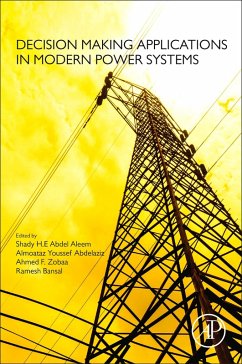
Modern Aspects of Power System Frequency Stability and Control (eBook, ePUB)
Versandkostenfrei!
Sofort per Download lieferbar
95,95 €
inkl. MwSt.
Weitere Ausgaben:

PAYBACK Punkte
48 °P sammeln!
Modern Aspects of Power System Frequency Stability and Control describes recently-developed tools, analyses, developments and new approaches in power system frequency, stability and control, filling a gap that, until the last few years, has been unavailable to power system engineers. - Deals with specific practical issues relating to power system frequency, control and stability - Focuses on low-inertia and smart grid systems - Describes the fundamental processes by which the frequency response requirements of power systems in daily operation are calculated, together with a description of the ...
Modern Aspects of Power System Frequency Stability and Control describes recently-developed tools, analyses, developments and new approaches in power system frequency, stability and control, filling a gap that, until the last few years, has been unavailable to power system engineers. - Deals with specific practical issues relating to power system frequency, control and stability - Focuses on low-inertia and smart grid systems - Describes the fundamental processes by which the frequency response requirements of power systems in daily operation are calculated, together with a description of the actual means of calculation of these requirements
Dieser Download kann aus rechtlichen Gründen nur mit Rechnungsadresse in A, B, BG, CY, CZ, D, DK, EW, E, FIN, F, GR, HR, H, IRL, I, LT, L, LR, M, NL, PL, P, R, S, SLO, SK ausgeliefert werden.













